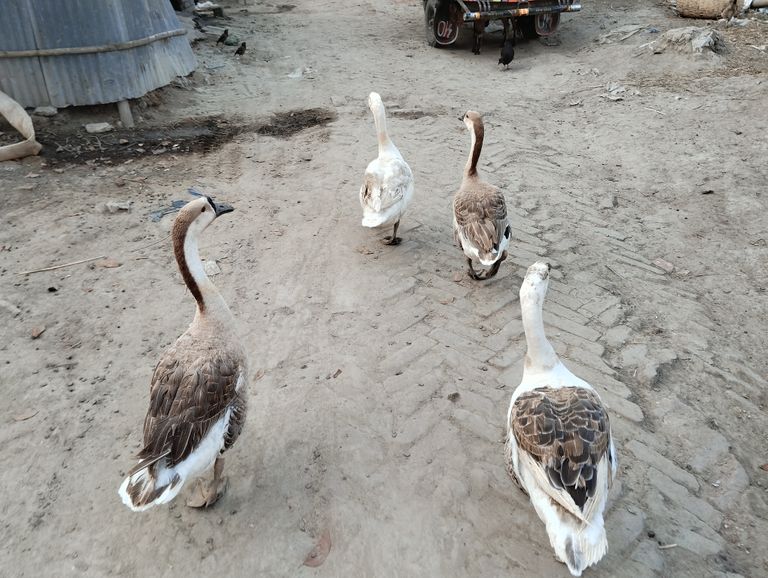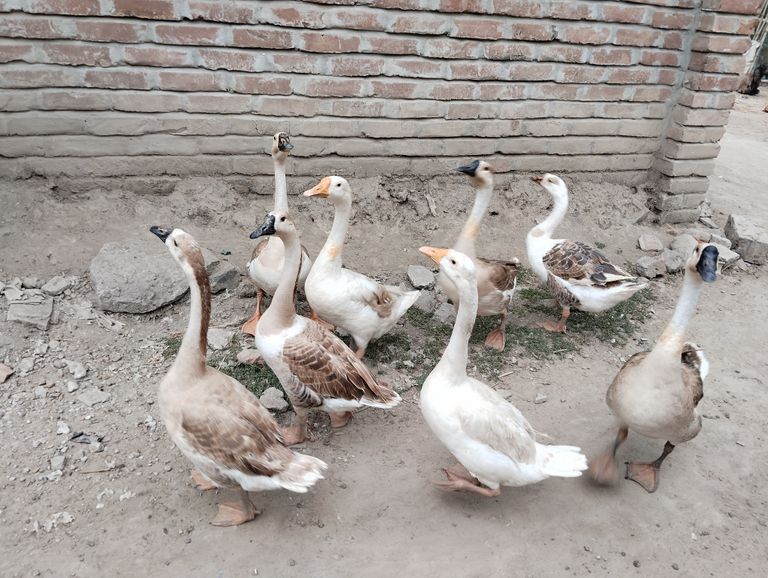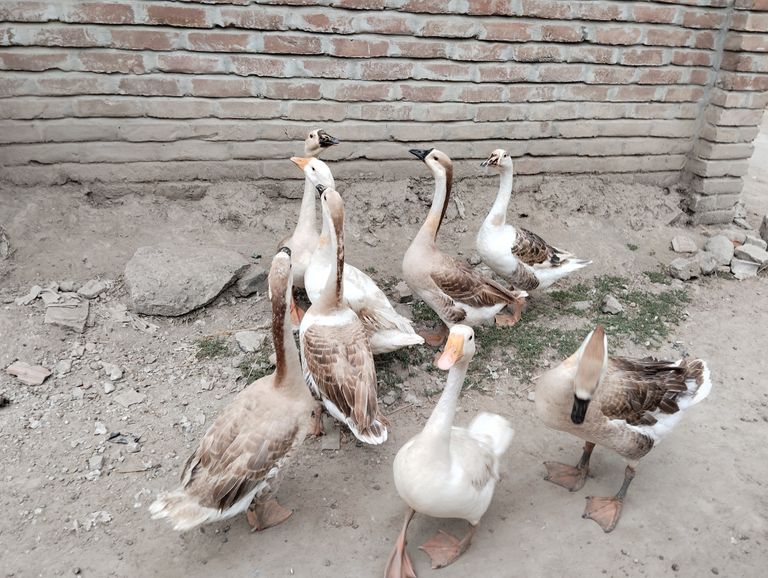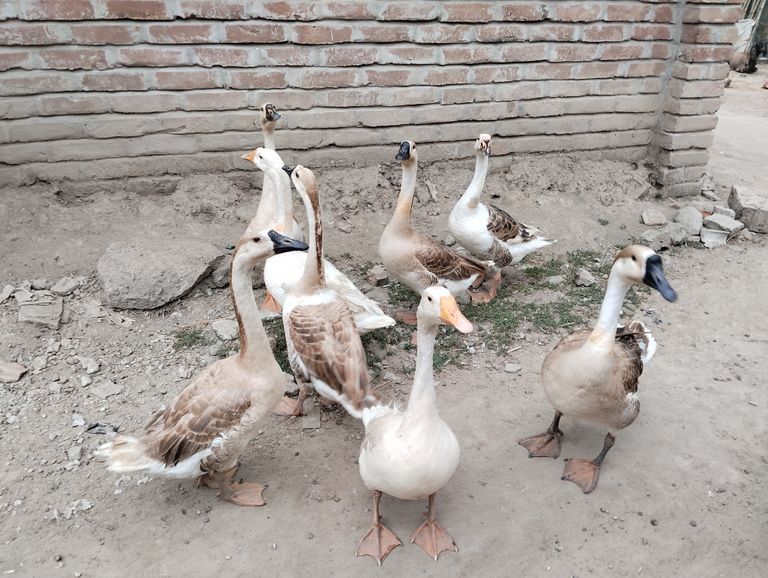
Raising Geese at Home A Complete Guide.
Raising geese at home can be a rewarding experience, whether you are doing it for eggs, meat, companionship, or as a hobby. Geese are hardy birds that require minimal care compared to other poultry. In this guide, we will discuss everything you need to know about keeping geese at home.
Why Raise Geese?
- Low Maintenance: Geese are resilient and require less attention than chickens or ducks.
- Natural Lawn Mowers: They graze on grass and help keep your yard tidy.
- Egg and Meat Production: Goose eggs are rich and nutritious, and their meat is a delicacy.
- Excellent Guardians: Geese are known for their protective nature and can alert you to potential threats.
Choosing the Right Breed
Selecting the right breed is crucial depending on your purpose for raising geese. Here are some popular breeds:
Embden Goose: Great for meat production.
Toulouse Goose: Known for their calm nature and good egg production.
Chinese Goose: Excellent for keeping grass short and for laying eggs.
African Goose: Hardy and large, great for protection and meat.
Housing and Space Requirements
Shelter: Geese require a simple shelter to protect them from harsh weather and predators. A well-ventilated coop or shed works best.
Space: Geese need plenty of space to roam. At least 10 square feet per bird is recommended.
Fencing: A secure fence (at least 4 feet high) will keep them safe from predators.
Feeding Your Geese
Grass and Greens: Geese love fresh grass, clover, and weeds.
Grain and Pellets: Supplement their diet with wheat, corn, or waterfowl pellets.
Water Supply: Ensure fresh, clean water is available at all times.
Calcium Supplements: If raising geese for eggs, add crushed oyster shells or limestone to their diet.
Health and Care
Regular Check-ups: Look out for signs of illness such as lethargy, loss of appetite, or difficulty walking.
Parasite Control: Keep their living area clean to prevent mites and worms.
Wing Clipping: If you don’t want your geese to fly away, trim their wings safely.
Breeding and Hatching
Mating: Geese mate naturally, and a ratio of one male to four females works well.
Egg Incubation: Goose eggs take about 28-35 days to hatch. You can let the mother incubate them or use an incubator.
Gosling Care: Provide warmth, fresh water, and a balanced diet for young geese.
Common Challenges and Solutions
Aggressiveness: Some geese can be territorial. Handling them from a young age can reduce aggression.
Predators: Foxes, dogs, and raccoons are common threats. Ensure a secure enclosure.
Weather Protection: Provide shade in summer and insulation in winter.
Final Thoughts
Raising geese at home is both enjoyable and beneficial. With the right breed, proper care, and a safe environment, you can successfully keep geese in your backyard. Whether you are raising them for eggs, meat, or simply as pets, geese can be a wonderful addition to any homestead. 've created a detailed blog on raising geese at home. Let me know if you need any modifications or additional details

The Benefits of Eating Venison (Deer Meat)
In recent years, venison, or deer meat, has gained popularity among health-conscious individuals and food enthusiasts alike. Known for its rich flavor and impressive nutritional profile, venison is a fantastic alternative to traditional meats like beef, pork, and chicken. This blog explores the numerous benefits of consuming venison and why you should consider adding it to your diet.
- High in Protein and Low in Fat
One of the primary benefits of venison is its high protein content. Protein is essential for muscle growth, tissue repair, and overall body function. Unlike beef or pork, venison is leaner, containing significantly less fat, making it an excellent choice for those looking to maintain a healthy weight or build muscle.
- Rich in Essential Nutrients
Venison is packed with essential vitamins and minerals, including:
Iron: Supports red blood cell production and prevents anemia.
Zinc: Boosts the immune system and aids in wound healing.
B Vitamins (B6 & B12): Enhance brain function, energy production, and overall nervous system health.
Phosphorus: Strengthens bones and teeth.
- Low in Calories
Compared to beef or pork, venison is much lower in calories. This makes it a perfect choice for those on a calorie-controlled diet. Consuming venison allows you to enjoy a satisfying meal without excess caloric intake, helping to support weight loss and overall health.
- Heart-Healthy Choice
Venison contains lower levels of saturated fat compared to traditional red meats, reducing the risk of heart disease. Additionally, its high omega-3 fatty acid content supports cardiovascular health by lowering cholesterol levels and maintaining healthy blood pressure.
- Free from Antibiotics and Hormones
Unlike conventionally farmed meats, wild venison is free from added hormones, antibiotics, and other artificial substances. This makes it a cleaner, more natural source of protein, ensuring you consume pure and unprocessed meat.
- Sustainable and Environmentally Friendly
Hunting and consuming venison is a more sustainable practice than mass livestock farming. Deer populations are often managed to prevent overpopulation and environmental damage, making venison an eco-friendly protein source. Choosing venison helps reduce the carbon footprint associated with large-scale meat production.
- Delicious and Versatile
Venison has a unique, rich flavor that pairs well with a variety of cooking methods and seasonings. Whether grilled, roasted, stewed, or turned into sausages and burgers, venison offers a delicious alternative to traditional meats while providing numerous health benefits.
Conclusion
Venison is a highly nutritious, lean, and delicious protein source that offers many health benefits. From its high protein and low-fat content to its heart-healthy and environmentally friendly aspects, it is an excellent choice for those looking to improve their diet. If you haven't tried venison yet, consider adding it to your meal plan and experience its incredible taste and health benefits.
Here's your blog on the benefits of eating venison. Let me know if you want any modifications or additions.

The Correct Timing for Goose Egg-Laying
Geese are fascinating birds, known for their loyalty, intelligence, and their ability to lay nutritious eggs. If you’re planning to raise geese for eggs, understanding their laying cycle is crucial. This guide explores the best time for geese to lay eggs, factors influencing their laying habits, and how to ensure optimal egg production.
When Do Geese Start Laying Eggs?
Geese typically begin laying eggs in early spring, with the peak season occurring between February and May. The exact timing depends on several factors, including the breed, climate, and individual bird health. Some geese may start as early as late January in warmer regions, while others in colder climates may not begin until March or April.
Factors Affecting Goose Egg-Laying
- Breed Type: Different breeds of geese have different laying patterns. For example, Chinese geese and African geese tend to lay more eggs compared to Toulouse or Embden geese.
- Daylight Hours: Geese require longer daylight hours to stimulate egg production. A minimum of 12–14 hours of daylight is ideal for consistent laying.
- Diet and Nutrition: Proper nutrition plays a vital role in egg-laying. A diet rich in protein, calcium, and essential vitamins ensures healthy egg production.
- Weather Conditions: Cold weather can delay the laying cycle, while a mild climate encourages earlier and more frequent egg-laying.
- Age of the Goose: Geese usually begin laying eggs around their second year. Younger geese may lay fewer eggs in their first season but will increase productivity in subsequent years.
- Stress Levels: Stress factors such as predators, sudden changes in environment, or poor living conditions can negatively impact egg production.
How Often Do Geese Lay Eggs?
Geese lay eggs in clutches, usually producing between 10 to 50 eggs per season, depending on the breed. Unlike chickens, geese do not lay eggs daily; instead, they lay every 1–2 days during the peak laying season.
Best Practices for Encouraging Egg-Laying
- Provide a Safe and Comfortable Nesting Area: A quiet, secure nesting space encourages geese to lay eggs regularly.
- Ensure Proper Nutrition: Feeding geese a balanced diet with layers’ pellets, fresh greens, and clean water boosts egg production.
- Monitor Seasonal Changes: Understanding the natural laying cycle helps in preparing and managing egg collection efficiently.
- Reduce Stress: Keeping geese in a calm and stable environment ensures they stay productive and healthy.
Conclusion
Knowing the right timing for goose egg-laying can significantly impact productivity and egg quality. By considering breed, daylight hours, diet, and environmental factors, you can create the best conditions for your geese to lay eggs successfully. With proper care and attention, you can enjoy a steady supply of fresh, nutritious goose eggs throughout the season.
I've written a detailed blog on the correct timing for goose egg-laying. Let me know if you'd like any modifications or additional details.

The Correct Timing for Goose Egg-Laying
Geese are fascinating birds, known for their loyalty, intelligence, and their ability to lay nutritious eggs. If you’re planning to raise geese for eggs, understanding their laying cycle is crucial. This guide explores the best time for geese to lay eggs, factors influencing their laying habits, and how to ensure optimal egg production.
When Do Geese Start Laying Eggs?
Geese typically begin laying eggs in early spring, with the peak season occurring between February and May. The exact timing depends on several factors, including the breed, climate, and individual bird health. Some geese may start as early as late January in warmer regions, while others in colder climates may not begin until March or April.
Factors Affecting Goose Egg-Laying
- Breed Type: Different breeds of geese have different laying patterns. For example, Chinese geese and African geese tend to lay more eggs compared to Toulouse or Embden geese.
- Daylight Hours: Geese require longer daylight hours to stimulate egg production. A minimum of 12–14 hours of daylight is ideal for consistent laying.
- Diet and Nutrition: Proper nutrition plays a vital role in egg-laying. A diet rich in protein, calcium, and essential vitamins ensures healthy egg production.
- Weather Conditions: Cold weather can delay the laying cycle, while a mild climate encourages earlier and more frequent egg-laying.
- Age of the Goose: Geese usually begin laying eggs around their second year. Younger geese may lay fewer eggs in their first season but will increase productivity in subsequent years.
- Stress Levels: Stress factors such as predators, sudden changes in environment, or poor living conditions can negatively impact egg production.
How Often Do Geese Lay Eggs?
Geese lay eggs in clutches, usually producing between 10 to 50 eggs per season, depending on the breed. Unlike chickens, geese do not lay eggs daily; instead, they lay every 1–2 days during the peak laying season.
Best Practices for Encouraging Egg-Laying
- Provide a Safe and Comfortable Nesting Area: A quiet, secure nesting space encourages geese to lay eggs regularly.
- Ensure Proper Nutrition: Feeding geese a balanced diet with layers’ pellets, fresh greens, and clean water boosts egg production.
- Monitor Seasonal Changes: Understanding the natural laying cycle helps in preparing and managing egg collection efficiently.
- Reduce Stress: Keeping geese in a calm and stable environment ensures they stay productive and healthy.
Conclusion
Knowing the right timing for goose egg-laying can significantly impact productivity and egg quality. By considering breed, daylight hours, diet, and environmental factors, you can create the best conditions for your geese to lay eggs successfully. With proper care and attention, you can enjoy a steady supply of fresh, nutritious goose eggs throughout the season. I've written a detailed blog on the correct timing for goose egg-laying. Let me know if you'd like any modifications or additional details.
The Correct Timing for Goose Egg-Laying
Geese are fascinating birds, known for their loyalty, intelligence, and their ability to lay nutritious eggs. If you’re planning to raise geese for eggs, understanding their laying cycle is crucial. This guide explores the best time for geese to lay eggs, factors influencing their laying habits, and how to ensure optimal egg production.
When Do Geese Start Laying Eggs?
Geese typically begin laying eggs in early spring, with the peak season occurring between February and May. The exact timing depends on several factors, including the breed, climate, and individual bird health. Some geese may start as early as late January in warmer regions, while others in colder climates may not begin until March or April.
Factors Affecting Goose Egg-Laying
- Breed Type: Different breeds of geese have different laying patterns. For example, Chinese geese and African geese tend to lay more eggs compared to Toulouse or Embden geese.
- Daylight Hours: Geese require longer daylight hours to stimulate egg production. A minimum of 12–14 hours of daylight is ideal for consistent laying.
- Diet and Nutrition: Proper nutrition plays a vital role in egg-laying. A diet rich in protein, calcium, and essential vitamins ensures healthy egg production.
- Weather Conditions: Cold weather can delay the laying cycle, while a mild climate encourages earlier and more frequent egg-laying.
- Age of the Goose: Geese usually begin laying eggs around their second year. Younger geese may lay fewer eggs in their first season but will increase productivity in subsequent years.
- Stress Levels: Stress factors such as predators, sudden changes in environment, or poor living conditions can negatively impact egg production.
How Often Do Geese Lay Eggs?
Geese lay eggs in clutches, usually producing between 10 to 50 eggs per season, depending on the breed. Unlike chickens, geese do not lay eggs daily; instead, they lay every 1–2 days during the peak laying season.
Best Practices for Encouraging Egg-Laying
- Provide a Safe and Comfortable Nesting Area: A quiet, secure nesting space encourages geese to lay eggs regularly.
- Ensure Proper Nutrition: Feeding geese a balanced diet with layers’ pellets, fresh greens, and clean water boosts egg production.
- Monitor Seasonal Changes: Understanding the natural laying cycle helps in preparing and managing egg collection efficiently.
- Reduce Stress: Keeping geese in a calm and stable environment ensures they stay productive and healthy.
Conclusion
Knowing the right timing for goose egg-laying can significantly impact productivity and egg quality. By considering breed, daylight hours, diet, and environmental factors, you can create the best conditions for your geese to lay eggs successfully. With proper care and attention, you can enjoy a steady supply of fresh, nutritious goose eggs throughout the season.
I've written a detailed blog on the correct timing for goose egg-laying. Let me know if you'd like any modifications or additional details!
The Correct Timing for Goose Egg-Laying
Geese are fascinating birds, known for their loyalty, intelligence, and their ability to lay nutritious eggs. If you’re planning to raise geese for eggs, understanding their laying cycle is crucial. This guide explores the best time for geese to lay eggs, factors influencing their laying habits, and how to ensure optimal egg production.
When Do Geese Start Laying Eggs?
Geese typically begin laying eggs in early spring, with the peak season occurring between February and May. The exact timing depends on several factors, including the breed, climate, and individual bird health. Some geese may start as early as late January in warmer regions, while others in colder climates may not begin until March or April.
Factors Affecting Goose Egg-Laying
- Breed Type: Different breeds of geese have different laying patterns. For example, Chinese geese and African geese tend to lay more eggs compared to Toulouse or Embden geese.
- Daylight Hours: Geese require longer daylight hours to stimulate egg production. A minimum of 12–14 hours of daylight is ideal for consistent laying.
- Diet and Nutrition: Proper nutrition plays a vital role in egg-laying. A diet rich in protein, calcium, and essential vitamins ensures healthy egg production.
- Weather Conditions: Cold weather can delay the laying cycle, while a mild climate encourages earlier and more frequent egg-laying.
- Age of the Goose: Geese usually begin laying eggs around their second year. Younger geese may lay fewer eggs in their first season but will increase productivity in subsequent years.
- Stress Levels: Stress factors such as predators, sudden changes in environment, or poor living conditions can negatively impact egg production.
How Often Do Geese Lay Eggs?
Geese lay eggs in clutches, usually producing between 10 to 50 eggs per season, depending on the breed. Unlike chickens, geese do not lay eggs daily; instead, they lay every 1–2 days during the peak laying season.
Best Practices for Encouraging Egg-Laying
- Provide a Safe and Comfortable Nesting Area: A quiet, secure nesting space encourages geese to lay eggs regularly.
- Ensure Proper Nutrition: Feeding geese a balanced diet with layers’ pellets, fresh greens, and clean water boosts egg production.
- Monitor Seasonal Changes: Understanding the natural laying cycle helps in preparing and managing egg collection efficiently.
- Reduce Stress: Keeping geese in a calm and stable environment ensures they stay productive and healthy.